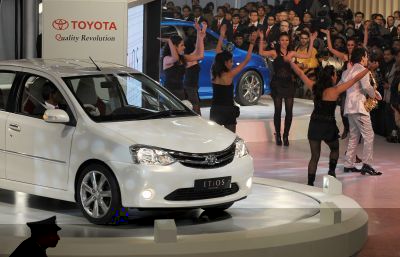Small cars take centre stage at Delhi auto show

Global car manufacturers eyeing the explosive growth of the Indian market unveiled new compact models at the Delhi auto show Tuesday in a bid to break the dominance of entrenched local producers.
Japanese groups Toyota and Honda, Germany's Volkswagen and US giant General Motors unveiled new models specially designed for the growing car-buying middle classes and the country's notoriously bad roads.
All face a challenge in a market growing at more than 10 percent a year because of the dominance of local Indo-Japanese producer Maruti Suzuki, which has a 55 percent market share, and Indian groups Mahindra & Mahindra and Tata.
"In terms of total volume of sales we are not a big player, but this will change it," Volkswagen India marketing manager Lutz Kothe told AFP after presenting the group's new India-made Polo.
The compact hatchback will hit the roads in March at an as yet undisclosed price and will aim to take on the popular Swift model made by Maruti.
This year's Delhi auto show is the 10th, but it first caught the world's attention in 2008 when Indian manufacturer Tata Motors unveiled its Nano, the world's cheapest car.
The 115,000-rupee (2,500-dollar) Nano added impetus to the race to produce cheap, small vehicles, which account for 80 percent of all car sales in India.
Two-wheelers still account for most passenger vehicle sales, but rising incomes mean Indians are following the familiar pattern of upgrading their transport from push bikes, to motorbikes, then to cars.
Total car sales are forecast to reach two million this year and triple in the next decade, according to industry estimates.
AutoExpo 2010, which runs in New Delhi until January 11, features 10 global releases of vehicles designed for India's new consumer generation.
Japan's Toyota took the wraps off its first compact model designed especially for the country, which has adapted suspension for the rough roads, plenty of storage space for large families and an engine for city driving.
The Etios will probably be launched later this year, the company said, at a price - so far undisclosed - that will attract young professionals and families.
Toyota's plan is to export it from India, which, though lacking in important infrastructure such as cutting-edge ports, is fast developing as a small-car production hub.
"It's not a copy of a Japanese or European model," said Kazuo Okamoto, vice chairman of Toyota, at the presentation. "Etios is newly developed for customers in India."
Recent months have seen foreign giants Ford, Hyundai and Renault join a stampede to India, where each has promised a small, cheap model designed for what Ford boss Alan Mulally termed the "sweet spot" of the market.
Japan's Honda unveiled for the first time a small car concept model that it aims to start selling next year, while General Motors put on show its new 7,000-dollar Beat model for the first time.
"The Indian car market is a market for small cars," Jhaneswar Sen, marketing director for Honda India told reporters. "Eighty percent of the sales are for the hatchback market."
Foreign manufacturers have woken up to India's potential, but analysts and industry experts believe competition is set to be fierce in the compact and small car segment as new models are launched.
India's market has gone from a largely closed one two decades ago when consumers had only a couple of locally-made alternatives to one offering a plethora of choices.
Maruti Suzuki - majority owned by Japan's Suzuki in which Volkswagen intends to buy a nearly 20 percent stake - said it was aware of the pressure on its market share.
"We are trying to expand our portfolio and refresh our products to offer customers new cars," said I.V. Rao, senior director at the group, when asked about the competition.
Karl Slym, head of GM India, hopes its Beat model will help increase sales in India for the struggling US giant by 30 percent this year, but he admitted that the competition was getting tough.
"There is a competitive market in India," he told reporters. "There are more and more players coming in with different capabilities."
adp-blb/bgs
Subscribe to Independent Premium to bookmark this article
Want to bookmark your favourite articles and stories to read or reference later? Start your Independent Premium subscription today.

Join our commenting forum
Join thought-provoking conversations, follow other Independent readers and see their replies